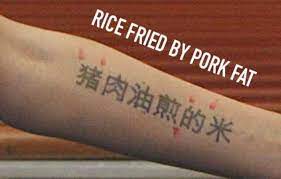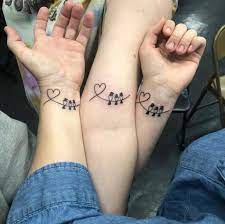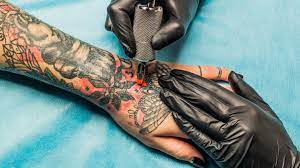
Acquiring Tattoos can be challenging. There’s much to consider: design, meaning, placement, and, most importantly, spelling. Chinese characters are written using a logographic language, where each grapheme represents a word or morpheme. Therefore, if miswritten, they will carry no significance at all.
Chinese characters are intricate and require precise execution to convey meaning correctly. A slight alteration or missing stroke can alter an entirely different interpretation. Unfortunately, due to poor designs or Western tattoo artists attempting to add flair, many people end up with insignificant Chinese Tattoos that are not related to reality. This serves as a reminder to research before inking words onto our bodies. In this case, two characters represent “fast,” while the last character means “foolish,” resulting in a translation failure.
Chinese society traditionally frowns upon Tattoos as they’re associated with criminality and gang affiliation. However, more young Chinese opt for them than ever, and this stigma gradually dissolves. Unluckily, this trend has resulted in some shockingly bad tattoos. Not to make light of it all, but while these characters make sense independently, they do not translate to any meaningful phrase in Chinese. One example demonstrates how kanji, which could mean “vegetable” in English, means “rookie” in Chinese.
Tattooing an incomprehensible Chinese character is bad enough, but getting one that violates grammar takes the cake. This likely represents an attempt at writing someone’s name in Kanji upside-down – with its second character woefully out-proportioned to its first. For those unfamiliar with Chinese, it’s wise to run any designs through someone who does. Random symbols will only sometimes make sense together. Additionally, it’s advised against getting an ink that says “Death” as it carries negative connotations.
China holds an ingrained stigma against Tattoos dating back millennia to Confucianism. Tattooing was once a badge of shameful societal membership, marking criminals, military deserters, and prostitutes. Confucius believed adorning oneself with art was considered impolite. Though this tattoo technically speaks to its intended meaning, there may be better, more appropriate ways of conveying it without making the word appear related to murderers. Consult someone who knows Chinese before getting an unfamiliar tattoo.
While this tattoo may not be as offensive as those worn by Bieber or Timberlake, it still raises significant issues. Numerous grammar errors are present, and their meaning must be corrected. The rendering of characters ‘Mu’ (canopy) and Chen (mountain) appears haphazard, with mistakes in form and missing strokes. Tattooing Chinese characters onto your body might seem like a cute idea, but it’s essential to understand their language, or else the results could be embarrassing or offensive. Professional services should handle the job for the best results.

